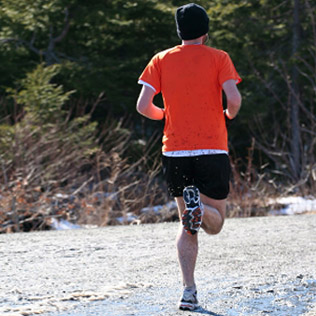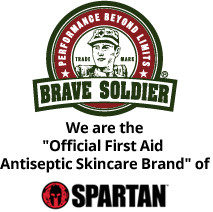
Moisture
Moisture, which in this case, is really just a polite way to say sweat. Not that there's anything wrong with sweating. In fact, sweating is pretty much how you know you're pushing yourself hard enough. And keep in mind, you perspire mainly for the purposes of thermoregulation, the evaporation of sweat has a cooling effect on the skin. All of that is fine and well, but it's not particularly effective in areas that are not exposed to the air, such as parts covered by underwear or socks.
In these areas under moist conditions, it is common for otherwise normal and controllable bacteria to thrive, resulting in jock itch and athletes foot.
- Keep your feet as dry as possible by wearing socks made from synthetic materials designed to absorb and wick away excess moisture. Also, wash your socks often.
- When you're done exercising, wash, dry, and air out your feet.
Avoid developing athlete's foot:
- Keep the skin around the groin area as dry as possible.
- Work out in loose clothing, this includes underwear.
- Shower/bathe and change into clean clothes as soon as possible.
Avoid jock itch:
Friction
Friction is one of the most common causes of skin problems, especially when rigorous physical activity is involved. In areas where skin rubs clothing or another skin surface, like between the legs, chafing is likely to occur. Friction from clothing can also cause an irritation, and even bleeding, of the nipples, often called jogger's nipples. This condition can be avoided by using adhesive bandages. One of the best products available to prevent friction related problems is Brave Soldier's Friction Zone which provides long lasting protection from any sports activity where gear chafing of your skin is a problem. Its occlusive silicone/botanical barrier is cold water and sweat resistant and offers superior anti-chafing and helps prevent blisters and reduce rash irritations. No petrolatum so safe for wet suits.
Another malady resulting from heat, pressure, occlusion, and friction is known as Acne Mechanica. Acne Mechanica usually occurs on the shoulders, back, head and other areas covered by tight synthetic clothing or protective gear and equipment such as helmets and shoulder pads. Acne Mechanica can be avoided by wearing clean clothing made of cotton or synthetic materials designed to breathe or wick away moisture from the body. Also, washing the affected areas following activity is important.
Blisters are also a major problem with sports activities that require constant movement. This friction, caused by movement, and made worse by perspiration, commonly results in painful blisters and can significantly reduce your ability to compete. Depending on the particular sport, there are a number of things you can do to prevent blisters. Applying Friction Zone or antiperspirant to the bottom of your feet prior to athletic activity may actually prevent blisters. Also, foot powders and spray antiperspirants that contain aluminum chlorhydrate or aluminum chloride may also decrease moisture.
The right choice of socks and shoes can effectively reduce the risk of serious blisters. Wearing acrylic socks, as opposed to cotton socks, can eliminate friction as well as allow your feet to remain dry. Shearing forces can be minimized by the layering of socks or using special double-layered socks. As far as shoes go, it's best to use a shoe designed specifically for your activity. Also, make sure to properly break in new shoes prior to using them on the track or court. And make sure they fit well by trying them on with the same socks, insoles or orthotic inserts as you plan on wearing. If blisters do develop, they are easy to deal with of if you follow a few simple guidelines. Keep in mind that small, intact blisters that don't cause discomfort usually need no treatment, and nature's best protection against infection is a blister's own skin, or roof.
However, to protect the blister, a small adhesive bandage can be used, if practical. Larger or painful blisters that are intact should be drained without removing the roof. Clean the blister with rubbing alcohol or antibiotic soap and water. Then heat a straight pin or safety pin over a flame until the pin glows red, and allow it to cool before puncturing a small hole at the edge of the blister. Once the fluid is drained, apply an antibiotic ointment, such as Brave Soldier Antiseptic Healing Ointment. If you already have blisters you may require additional padding to protect them during continued sports activity. Ring-shaped pads made of felt will protect small blisters, however, large blisters may require dressings.
Sun Damage
One of the more damaging aspects of participating in outdoor sports such as baseball, golf and tennis, is the threat of ultraviolet (UV) light. Overexposure to UV light can lead to skin cancer and premature aging. Additionally, severe sunburns may predispose a person to skin cancer. Also, the higher the altitude, the greater the risk of sunburn. The American Academy of Dermatology recommends that everyone wear a broad-spectrum sunscreen with an SPF of 15 or higher - even on cloudy days. It is also advisable to wear protective clothing and avoid the midday sun from 10 a.m. to 4 p.m. Brave Soldier has 2 great products that protect against the sun.
Solar Shield is a remarkable hypoallergenic moisturizing sunscreen specifically formulated to provide broad-spectrum UVA & UVB protection. Lip Defender offers a crystal clear formula that hydrates and protects tender lips. Its advanced formulation and SPF 15 prevent chapping, sunburn, windburn and leave lips super soft.
Extreme Cold
Frostbite is a medical condition whereby damage is caused to skin and other tissues due to extreme cold and results in a reduction in blood flow in some areas of the body to dangerously low levels, causing the skin and tissue to literally freeze. This usually effects extremities such as the hands and feet first, but also often effects the face due to exposure. Any area of the body that appears frostbitten should be warmed as soon as possible, however, do not rub or massage the skin as rubbing may worsen any damage.
Infection
Wearing wet clothes after exercising greatly increases the risk of folliculitis, a bacterial infection of the hair follicle. Contact sports such as rugby and wrestling, as well as surfaces like pads and handles of weight machines, can aid in the spreading of bacteria resulting in folliculitis and a similar bacterial infection called impetigo. Boils are skin infections caused by common bacteria usually effecting hair follicles. They are caused when bacterium enters the hair follicle through small cuts in the skin. At that point, reddish, pus-filled lumps form that begin to feel tender, warm and painful. Most boils last about a week and can be soothed by applying a warm compress ,or by soaking the boil in warm water. Do not attempt to squeeze the boil, as this may spread the bacteria to other areas. After a boil drains, it should be cleansed with antibacterial soap and bandaged well. Consult a dermatologist if the boil does not drain itself.
